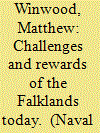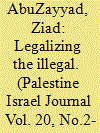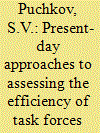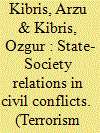| Srl | Item |
| 1 |
ID:
153991


|
|
|
| 2 |
ID:
138325


|
|
|
|
|
| Summary/Abstract |
The Israeli High Court’s decision, issued April 15, 2015, to apply the Absentee Property Law of 1950 to properties in East Jerusalem owned by Palestinians living in the West Bank, considering them absentee property, is nothing more than another tool to allow the occupation to loot Palestinian property, in the West Bank in general and in Jerusalem in particular, for the benefit of Jewish Israeli citizens.
|
|
|
|
|
|
|
|
|
|
|
|
|
|
|
|
| 3 |
ID:
081109


|
|
|
|
|
| Publication |
London, Routledge, 2008.
|
| Description |
xi, 144p.hbk
|
| Series |
Routledge Advances in South Asian Studies Series; 8
|
| Standard Number |
9780415437431
|
|
|
|
|
|
|
|
|
|
|
|
Copies: C:1/I:0,R:0,Q:0
Circulation
| Accession# | Call# | Current Location | Status | Policy | Location |
| 053222 | 954.9105/AZI 053222 | Main | On Shelf | General | |
|
|
|
|
| 4 |
ID:
174062


|
|
|
|
|
| Summary/Abstract |
This paper suggests a system of indices for assessing the functioning efficiency of the task forces control systems whose employment helps take into consideration the effect of basic factors in the control process.
|
|
|
|
|
|
|
|
|
|
|
|
|
|
|
|
| 5 |
ID:
172174


|
|
|
|
|
| Summary/Abstract |
Civil conflicts are conceptualized as asymmetric, population-centric military struggles. The argument is that insurgencies, even though they are no match in military power to their state adversaries in many cases, resort to armed struggle nonetheless as a tool to impair state capacity, the quality of governance, and the ability of the state to honor the “social contract” in order to eventually destroy state authority and render the state irrelevant for the society. Note that this argument implies that state-society relations do react to the military course of the conflict. In this article, we provide empirical evidence for this implication. Introducing a new panel dataset on the long-running civil conflict in Turkey, we first conduct a micro-level analysis and demonstrate the significant impact rebel presence has upon state-society relations across localities and time. We then analyze the results of semi-structured interviews we had conducted with a group of experts from the conflict regions to decipher the possible mechanisms behind the association we observe in the data. The interviews support our motivating theoretical argument.
|
|
|
|
|
|
|
|
|
|
|
|
|
|
|
|